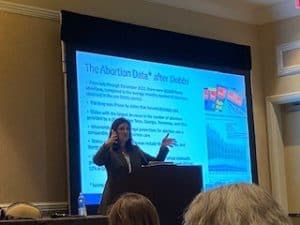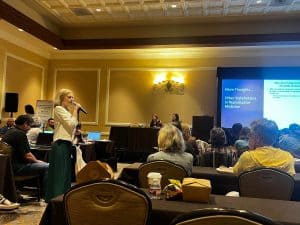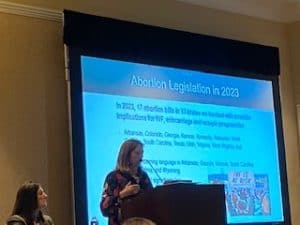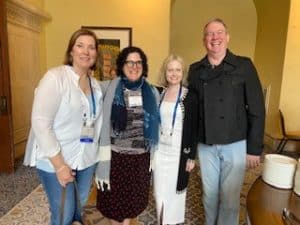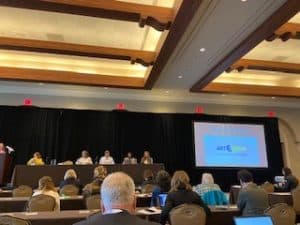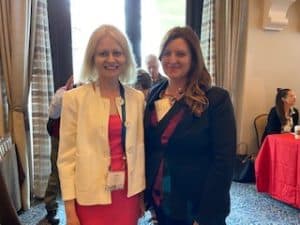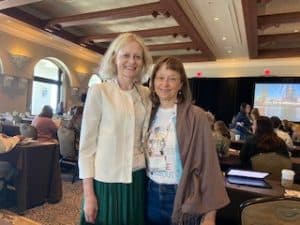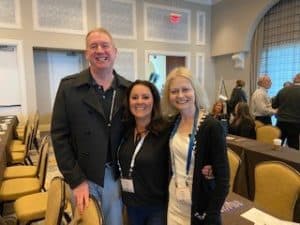9 May 2023
The American Academy of Adoption & Assisted Reproduction Attorneys (AAAA) Huntingdon Beach, California, Annual Conference from 30 April – 2 May 2023 provided an in-depth review of current issues and challenges impacting fertility patients, intended parents, surrogates and professionals across the US assisted reproductive technology sector. This included a session which highlighted the importance of countering “anti-family legislation” across the US in the post-Dobbs era. It shone a light on the “anti-family movement” in the US and the need to continue to advocate for families and reproductive healthcare.
Photographs feature: Lisa Rinehart, JD, RN and AAAA United Kingdom Fellow/Lawyer Louisa Ghevaert.
It was sobering to hear that in 2023 there are currently17 abortion bills in 13 US States raising potential implications for IVF, miscarriage and ectopic pregnancies (including Arkansas, Colorado, Georgia, Kansas, Kentucky, Nebraska, North Carolina, South Carolina, Texas, Utah, Virginia, West Virginia). From July – December 2022 there were also 32,260 fewer abortions compared to the average monthly abortions across the US pre-Dobbs, with the largest decrease in abortions in Texas, Georgia, Tennessee and Ohio; raising as yet unanswered questions about the implications and legacy of this, particularly for women, children and families. Whilst IVF currently remains legal in all US states, the Dobbs legal ruling has reportedly shaken the foundation of IVF practices in the US. As such, greater care is now needed to understand and navigate the additional legal and practical challenges and risks associated with IVF requiring an assessment of: geography, embryo management, treatment implications during pregnancy and informed consent.
Photographs feature: Barb Collura President/CEO Resolve, Lisa Rinehart, JD, RN, AAAA Fellows Judith Hoechst from Colorado, Christine Henry Andresen from Texas, Louisa Ghevaert from the United Kingdom and Stephen Page from Brisbane Australia.
In terms of geography, the AAAA update highlighted the importance of knowing the US state in which IVF treatment is to be undertaken and understanding the type and stability of the “climate” there. This includes understanding any restrictions or difficulties that might apply to IVF treatment or pregnancy care or whether it might be necessary to cross US state lines to access an abortion (e.g. following an ectopic pregnancy), as well as any conflicts of law that might arise. This has been brought into even clearer focus since one in ten abortions in the US in 2020 involved patients who crossed state lines and since April 2023 Idaho made it a felony for a non-parent adult to help a minor cross state lines to obtain an abortion.
The AAAA update further addressed the challenges when medical records cross state lines. This shone a light on important issues and implications when abortion records transfer from a permissive to a non-permissive US abortion state. It further highlighted that in some states anti-abortion groups and professionals are looking for this sensitive information in order to bring legal cases. As a result, particular care is now required to protect sensitive reproductive health information.
Photographs feature: AAAA Fellows Louisa Ghevaert from the United Kingdom and Ellen Trachman from Colorado.
From an embryo management perspective, the AAAA update predicted that there will likely be more cycles of PGT undertaken in some parts of the US in order to decrease the numbers of embryos available for transfer. However, this is likely in turn to raise questions about what to do with abnormal embryos and raiseconcerns about the numbers of mosaic embryos being transferred.
The AAAA session also highlighted that there could be more cycles of egg freezing in the US moving forward, rather than embryo freezing. In doing so, this is likely to increase the overall costs of fertility treatment. The session further questioned whether there could be further changes to embryo storage arrangements, since personhood bills in some US states could change the legal status of embryos. As such, concerns have already been raised that transporting embryos might be treated as “trafficking” in cases where US state personhood bills apply language of “child” to embryos for legal purposes. Moreover, the session highlighted issues about who will have control over embryo disposition choices moving forward and whether this will be permissive given the evolving legal picture across the US.
Photographs feature: AAAA Fellows Louisa Ghevaert from the United Kingdom and Lynn Bodi from Wisconsin.
It was further sobering to hear that post-Dobbs, appropriate medical treatment has been jeopardized in some US states for miscarriage, ectopic pregnancy and multiple pregnancies. This matters because if an ectopic pregnancy causes a fallopian tube to rupture, it can result in a 95 percent mortality rate for the pregnant woman and represents a serious problem and a conflict between established medical standards of care and legislation in some US states. This is also resulting in concerns amongst medical providers, who are becoming more risk averse and worried that they could leave themselves open to civil or criminal prosecution. In view of this, the session explained that medical providers need to let patients know about ectopic pregnancy and other related risks, since medical treatment may not be available in some US states if needed moving forward.
Photographs feature: AAAA Fellows Stephen Page from Brisbane Australia, Kimberly M. Surratt from Nevada and Huntingdon Beach, Calfornia.
Finally, the AAAA session highlighted the importance of continuing to stay abreast of US state legal changes in abortion related law. There needs to be ongoing care with application of protective language in policies, conversations and documentation. Moreover, additional thought and care is needed in terms of the risks associated with moving embryos, including risk of loss during transport and extra costs incurred.
Need an expert global family formation lawyer or fertility lawyer? For further information and assistance please contact Louisa Ghevaert by email louisa@louisaghevaertassociates.co.uk or by telephone +44 (0)20 7965 8399.


